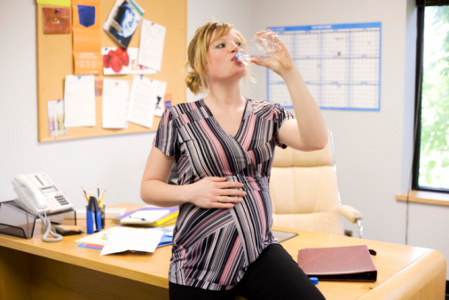Things Every Pregnant Woman Should Know
0 Comments
Planning Ahead
Congratulations! You are about to experience a most wonderful life changing event. For the next nine months, everything you eat, drink and inhale will directly affect the life of another human being. Conscientiously follow the recommendations of your obstetrician, nurse practitioner or midwife. Here are some gentle reminders to keep you and your baby healthy. Photo: Getty Images

Limit Seafood Consumption
Seafood can be a good source of protein, iron and the essential nutrients for a fetus’s growth development. But, some types of seafood contain contaminants such as mercury. Mercury can affect your developing baby’s brain and nervous system. Large predatory fish such as swordfish, shark, king mackerel and tilefish contain high levels of mercury and should be avoided by pregnant women or women who are planning to become pregnant. The FDA advises pregnant women to not eat more than 12 ounces of low mercury fish weekly. You can safely choose from a variety of seafood with low levels of mercury like salmon, canned light tuna, shrimp, catfish and pollock. Photo: Getty Images

Avoid Eating Raw Shellfish
The greatest danger comes from eating raw or undercooked mollusks, such as clams, oysters, mussels, snails, squid and octopus. Harmful viruses, such as hepatitis A and Norwalk virus, are linked to seafood harvested from contaminated waters. Bacteria, like vibrios, occur in shellfish and toxins, like histamine, occur in mainly in fresh tuna, mahi mahi, mackerel and bluefish. Store fresh shellfish in the refrigerator in ventilated containers, uses as quickly as possible and cooked thoroughly until the shells open. If the shell of any clam, oyster or mussel does not open after cooking, it is dead and must be discarded. Photo: Getty Images

Skip Smoked Seafood
You will be taking unnecessary risks by eating smoked seafood. You should not eat refrigerated smoked seafood fish, such as salmon, trout, whitefish, tuna, cod and mackerel, unless it is an ingredient in a cooked dish. These fish carry the bacterium called listeria which causes listeriosis. Listeriosis is a devastating disease for pregnant women leading to miscarriages and premature delivery. Listeria can cross the placenta and infect your unborn child. Photo: Getty Images

Pass on Deli Meats
As a pregnant woman, you are about 20 times more likely to contract listeriosis than other healthy adults. Listeria is found in soil and water and animals can carry this bacteria. Though listeria is killed by pasteurization and cooking, certain ready-to-eat processed foods, such as cold cuts and hot dogs, can become contaminated after cooking but before packaging. The CDC advises pregnant women not to eat hot dogs and deli meats, unless they are reheated until steaming hot. Avoid getting fluid from hot dog packages on other foods, utensils, and food preparation surfaces, and wash hands after handling hot dogs, luncheon meats, and deli meats. Photo: Getty Images

Do Not Eat Cheese Made from Unpasteurized Milk
Unpasteurized milk and products made from unpasteurized milk can be contaminated with listeria. You need to avoid eating soft cheeses, such as feta, Brie, Camembert, blue-veined cheeses and Mexican-style cheeses, like queso blanco, queso fresco, and Panela, unless they have labels that clearly state they are made from pasteurized milk. Photo: Getty Images

Limit Your Caffeine Intake
Caffeine can cross the placenta and impact your baby’s heart rate. The potential effects of caffeine on an unborn child include low birth weight and slow fetal growth. Excess caffeine consumption is linked to an increased risk of miscarriage and stillbirth. Follow your healthcare providers recommendations on caffeine intake. Photo: Getty Images

Beware of Herbal Teas
Talk to your obstetrician about the safety of drinking herbal teas, even products marketed specifically for pregnant women. According to the staff of the Mayo Clinic, there is little data on the effects of specific herbs on a developing fetus. However, large amounts of red raspberry leaf tea can cause contractions. Photo: Getty Images

Avoid Alcohol
It is wise to talk to your healthcare provider about drinking alcoholic beverages. It is known that women who drink alcohol during pregnancy have an increased risk for miscarriage and stillbirth. Excessive maternal alcohol consumption leads to fetal alcohol syndrome. Characteristics of fetal alcohol syndrome include low birth weight, facial abnormalities, developmental delays, failure to thrive, behavioral problems such as hyperactivity, and learning difficulties. Photo: Getty Images

Pass on Unwashed Fruits and Vegetables
To reduce risking your health and the health of your unborn child, thoroughly wash all fresh, raw fruits and vegetables. As an added precaution to eliminate any harmful bacteria, remove any damaged or bruised spots. Avoid eating raw sprouts such as alfalfa, clover, radish and mung beans. Photo: Getty Images

Stay Away from Foods Containing Raw Eggs
Raw eggs can be contaminated with the harmful bacteria, salmonella. Always cook eggs until the yolks and white are firm. Avoid anything made with raw eggs, like a Caesar salad dressing, that has not been thoroughly cooked. Photo: Getty Images

Avoid Cat Feces
The transmission of an infection called toxoplasmosis occurs from contact with cat feces. Women who have owned cats for a long time have a 15% change of immunity to toxoplasmosis. The risk for severe problems in the unborn child are greatest during the 10th and 24th weeks of gestation. The risk of premature birth, low birth weight, fever, jaundice, abnormalities of the retina, mental retardation, abnormal head size, convulsions, and brain calcification is about 5 to 6%. To be safe, wear gloves at all times while gardening and have someone else empty the cat’s litter box. Sources American Pregnancy Association: Mercury Levels in Fish Alaska Seafood: Seafood Safety BabyMed: Is Smoked Seafood Safe During Pregnancy? CDC: Listeriosis Mayo Clinic: Pregnancy Nutrition: Foods to Avoid During Pregnancy KidsHealth: Fetal Alcohol Syndrome American Pregnancy Association: Pregnancy and Pets Article by Maryann Gromisch Photo: Getty Images
Add a CommentComments
There are no comments yet. Be the first one and get the conversation started!